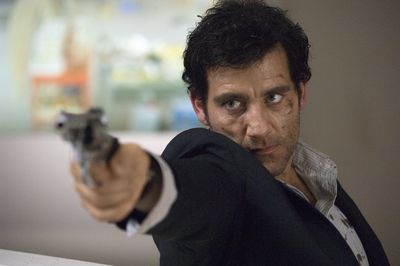King of cool? Clive Owen would rather be McQueen

Clive Owen was born with the whole “tall, dark and handsome” thing.
But “the strong, silent type” that got him tagged “the new Steve McQueen” as his film career took off? That, he cultivated.
“Nothing wrong with being compared to Steve McQueen, is there?” jokes Owen, whose new movie, “The International,” opens today.
That persona was evident in “The Hire,” an acclaimed series of 2001-2002 short films for the Internet in which Owen played a getaway driver of few words. It hung in the air every time someone mentioned him as a possible “next James Bond.”
He may do the odd period piece (“Elizabeth: The Golden Age”), straight drama (“Closer”) or genre send-up (“Shoot ’em Up”). But the Clive Cool, like the McQueen Cool, is most at home in thrillers such as “The International” or the upcoming “Duplicity.”
“He’s got a real quality of stillness, like (Clint) Eastwood or Michael (Caine),” says Mike Hodges, who directed Owen in his breakthrough film, 1998’s “Croupier.”
That’s the movie “that introduced me to America,” Owen acknowledges, and created his screen persona: A “quiet type,” yes, but a man who narrated the drama of his own life.
“There was something very unusual in that film, in the way the voice-over was used,” Owen says. “The narrator was the key character in the movie. You felt like you were in this guy’s head.”
Owen used “Croupier’s” cool dialogue as a benchmark for analyzing scripts: “If the dialogue doesn’t sound natural to me, I won’t do it.”
The dialogue in “The International” promised that. Lines such as “There’s what people want to hear, what people want to believe, there’s everything else. Then there’s the truth” – and the even pithier, “Sometimes a man can meet his destiny on the road he took to avoid it” – lured Owen in.
That, and the film’s story about an Interpol agent’s dogged pursuit of a corrupt, all-powerful European bank, joining forces with an American district attorney (Naomi Watts).
“It always felt like a relevant script, but no one could have anticipated things would turn out the way they have in the world of finance,” Owen says. “We finished this film over a year ago. This whole banking meltdown seems to give it an immediacy that’s pretty rare.
“There are plenty of examples of corporations that are, if not above the law in many of the countries they deal with, that they’ve at least co-opted the laws and law enforcement of that country,” he says.
“And I liked that I’m playing a very fallible character, a man with limitations – angry, passionate, obsessed, maybe heroic because of how far he’s prepared to go to see to it that his sense of justice prevails, that this corrupt institution is brought down.”
Owen, 44, says he is attracted to characters “who are grappling with some kind of inner conflict,” which is one reason he “begged, begged” writer-director Tony Gilroy (”Michael Clayton”) for a role in the corporate spying thriller “Duplicity” (coming in March).
There also was the chance to re-team with his “Closer” co-star, Julia Roberts. But the deal-maker?
“Dialogue to die for, the best dialogue I’ve read in years,” says Owen. “That sold me.”